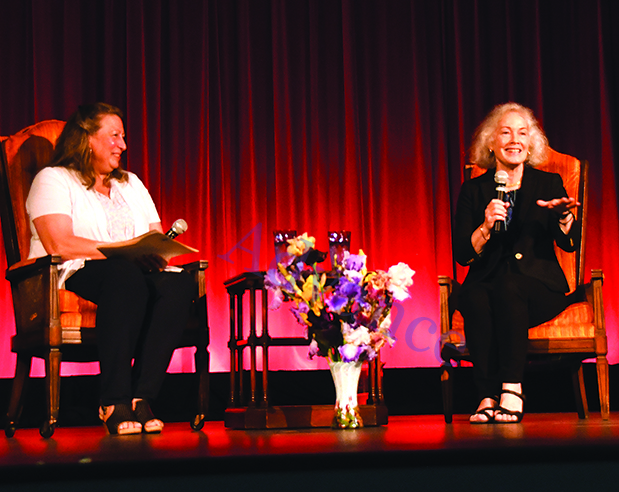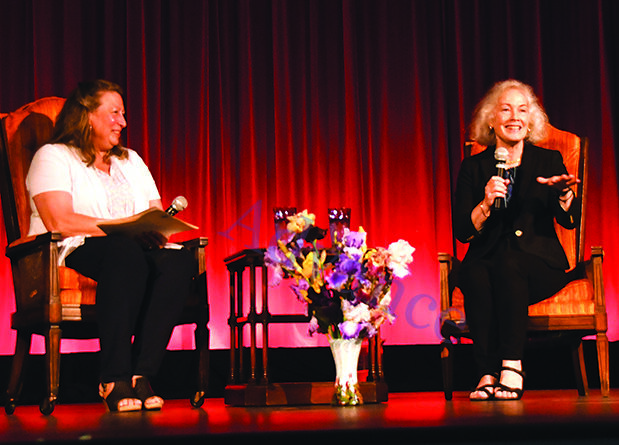Former ambassador brings views on world affairs to local stage

by Richard Lamb–Advance Editor
An appreciative audience that filled nearly every seat in the Rogers Theater got an inside look at world diplomacy. Former ambassador to Ukraine, Marie Yovanovitch, a career member of the U.S. State Department, showed why she succeeded as a representative of the interests of the United States for more than 30 years.
The event was sponsored by the Rogers City Area Zonta Club and the Presque Isle District Library.
Her career as an ambassador famously ended in the spring of 2019 when she was asked to get on the next airplane out of Ukraine and head back to Washington, D.C. But before she talked about that saga, one that involved former President Donald Trump damaging her reputation with unfounded claims and chilling threats, she told about herself.
She is the child of immigrants who came to the U.S. from Eastern Europe after World War II. They slowly made their way west after surviving some bad times.
“It is an unsung story of heroism against amazing odds. My parents ended up in the United States with me and they were so blessed,” she said. The family settled in a small town in Connecticut with other people of Russian decent during the Cold War. Her parents taught language in the local high school, stressing the importance of giving back to the community.
“WE NEEDED to be part of everything that strengthened the community. They left it up to us to choose what we had an interest in,” she said and her choice was to join the foreign service. The appeal of traveling, meeting people from other counties, history, politics and learning about different cultures drew her to that calling. Her career lasted 33 years and took her around the world.
She said diplomacy is an art in the establishment of relationships.
“The reason why we have different embassies around the world is because there is no substitute for personal interaction,” she said, noting that it is not only important to build ties with the current and future leadership of a country, but also businesses, citizens and the press.
Yovanovitch said information gathering is important to give feedback to leadership in Washington. She relayed a quote from former Secretary of State George Schultz that was his view on diplomacy.
“He said diplomacy was like gardening. Using the metaphor that the garden is the world. He said that if you don’t work at it every day, you know what happens in your garden—weeds come up,” she said.
Since the United States has interests all over the world, and it is unknown when that interest is going to be used, she said, it is important to work on those connections constantly. That became true after the terrorists attacked Sept. 11, 2001. The United States needed air bases in Central Asia and the friendships developed allowed that to happen quickly.
“That doesn’t just happen. It happens because of the quiet work of diplomacy, much of which happens behind closed doors, and should be behind closed doors,” Yovanovitch said.
AFTER 32 years in the foreign service Yovanovitch was considering retirement plans near the end of 2018 while serving as ambassador to Ukraine. But she had no idea how 2019 would turn out for her, drawing her into the spotlight in the world stage.
“Ambassadors are appointed by the president. That person may be a political appointee or somebody that has donated a lot of money to their campaign or that person could be a career diplomat, like me,” she explained.
“The political appointees get some pretty nice places to go to, no surprise. Career diplomats generally go to some of the less glamorous spots. Career diplomats don’t go to Paris,” she said with a laugh. “But I wanted to go to Ukraine. I had been appointed twice before, having been appointed by (former presidents) George W. Bush and Barack Obama.”
She arrived in 2016 and continued on after Trump was elected. Her time ended after Trump’s attorney, Rudy Giuliani started searching for ways to use information against Trump’s opponent Joe Biden regarding Hunter Biden’s work in Ukraine.
“They were hoping there was a corruption story there that maybe they could get the Ukrainian government to prosecute Hunter Biden and that this would throw some shade on the former vice president. And they thought that I would stand in the way of that, that I would find that would be too political and so they decided to get rid of me,” she explained.
She then told about how she was ordered back to the U.S. and how that led to her testifying before Congress at Trump’s second impeachment hearing.
Yovanovitch described the events that followed the July 25, 2019 telephone call between Ukraine president Volodymyr Zelenskyy and Trump where the former president encouraged the investigation of baseless claims against Joe Biden.
“Once the transcript of the telephone call was released at the end of September (2019) that is what people were focused on. But when I read that transcript, what I was focused on was the fact that the president of the United States, the most powerful man in the world raise me, who he had fired months ago, to another country’s president. It is most unusual that presidents would be talking about ambassadors, especially ones that are no longer in place,” Yovanovitch said.
TRUMP CALLED her “bad news, and she is going to go through something.”
“I thought, what does that mean, because I had already been fired. What more is going to happen to me?” she wondered.
Trump encouraged her to not testify at the hearings, but Yovanovitch, who by this time had hired a lawyer, went ahead with her testimony in October, 2019.
“As federal employees, we ar
Khris Sorgenfrei, daughter-in-law of Zonta Club member Kris Sorgenfrei, served as moderator for the event. She is an international educator who has taught in France, Turkey, El Salvador and Afghanistan.
(Next week, part two: Yovanovitch talks about the importance of supporting Ukraine and her optimistic view of world events.)



